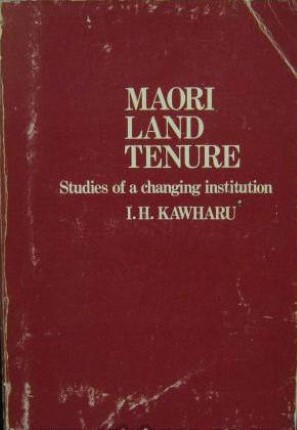
Māori Land Tenure: Studies of a Changing Institution – Hugh Kawharu (1977)

Māori Land Tenure was a significant contribution to a field of study that was and remains complex. Sir Hugh Kawharu (1927-2006; Ngāti Whatua) successfully produced a comprehensive record of the complexities associated with Māori land from the pre-Treaty of Waitangi period until the 1970s.
Publication details
Kawharu, I.H. Māori Land Tenure: Studies of a Changing Institution. Oxford, UK: Oxford University Press, 1977.
About the book
Sir Hugh Kawharu’s Māori Land Tenure was a welcome contribution in the 1970s to a field of study that was riddled with complexities and problems. The intricacies of any one aspect of the topic was sufficient for a major study in itself. Yet Sir Hugh Kawharu successfully produced a comprehensive record of the complexities associated with Māori land from the pre-Waitangi period to the 1970s. The culmination of almost twenty years' work, the book is based on two Oxford theses and several other pieces of research. The book draws this material together skillfully by emphasizing the factors of change that led to the continuing loss of Māori land.
Sir Hugh Kawharu, was a Professor in Māori Studies with a background in social anthropology, who was heavily involved in Ngāti Whatua tribal affairs. The book was more than just an academic publication to Kawharu, who was primarily concerned about the choices remaining to Māori in their future use of land resources. Within this book his message is clear: the main issues facing Māori in terms of their land was fragmentation as a direct result of nineteenth-century European laws, that substituted customary tenure with bi-lineal succession. Traditional rights of occupancy gave way to new rights based on Court title and it was inevitable that the social structure of the tribal grouping would be undermined, for, under the new system, different relationships and new sets of values developed.
Further information
- Out of print
This publication is part of the series Te Takarangi: Celebrating Māori publications - a sample list of 150 non-fiction books produced by a partnership between Royal Society Te Apārangi and Ngā Pae o te Māramatanga.
